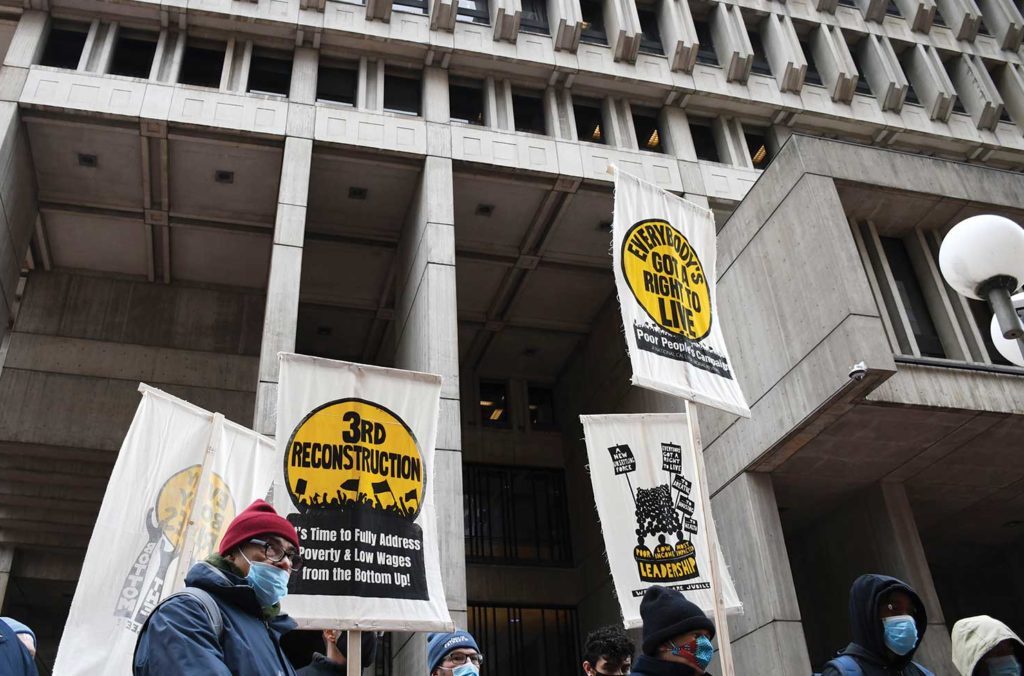Advocates call for rights for the homeless
Mass and Cass crisis galvanizes support for long-term solutions

In the November chill, members of the Union of the Homeless and other groups such as the Massachusetts Poor People’s Campaign and Housing = Health gathered outside of City Hall Nov. 17 to launch what they are calling their winter offensive, a series of events to advocate for more solutions to the crises at the area near Massachusetts Avenue and Melnea Cass Boulevard.
Savina Martin, spokesperson for the Homeless, compared the care of the city to that of a parent who fails to take proper care of her children.
“How about a mother who allows her family to deteriorate, to have no food, to sleep in boxes and in subway stations?” Martin said. “Their children would be removed from them immediately. So, today, we are here to say we are removing you from the care of our citizens.”
For Martin, that means more organizing and mobilizing to draw attention to issues surrounding poverty, systemic racism and ecological devastation and health.
“In practice it means that, for the immediate [future], those of us that are on the ground, fighting for justice, equity, equality and dignity are going to continue to push for that,” Martin said in an interview following the event. “Of course, it’s an analogy, we can’t totally do that, but it’s a true fact that … the government works for us, for the people, so I guess to say that the people are taking back their power.”
State Rep. Mike Connolly, who spoke at the press conference, said the city and state needs to change how it views its residents without houses and residents who are facing struggles with drugs.
“In this moment, the very first thing we need to do is stop the criminalization of being unhoused,” Connolly said. “We need to stop the criminalization of addiction, we need to stop the criminalization of health issues, of substance abuse issues, etc. We need housing-first policies.”
Connolly also spoke out in mixed support of a proposal discussed by Executive Office of Health and Human Services Secretary Marylou Sudders in a Nov. 15 email to city officials and community members. The proposal would provide beds and supports for up to 30 people in 18 private, lockable cabins on the grounds of Lemuel Shattuck Hospital on the edge of Franklin Park.
The cabins would be built by the company Pallet, according to reporting from The Boston Globe. Under the proposal, the Baker Administration would partner with a local provider for services such as meals, laundry and health needs. Other services would also be offered to help those staying in the cottages who have mental health challenges or struggles with drug addiction .
Connolly said more is needed to help the residents at Mass and Cass, but said he thinks the Shattuck Hospital option is better than an alternative proposal from Suffolk County Sherriff Steve Tompkins to relocate those living in tents at Mass and Cass to an unused building in the nearby Suffolk County House of Correction. Opponents have likened it to incarcerating those struggling with homelessness and addiction.
On the same day as the Homeless Union’s press conference, Mayor Michelle Wu, on her first full day in office, said to members of the press that the city would be halting the removal of people living in tents amid an ongoing lawsuit brought against Boston by the ACLU of Massachusetts.
The removals began under an executive order from then-acting Mayor Kim Janey in a move to get residents off the streets and into shelters and other services.
Wu didn’t commit to whether the removals would resume or not following the judge’s ruling. She said that members of her administration — led by Monica Bharel, a former Department of Public Health commissioner who was tapped by Wu to address the crises at Mass and Cass — are working to take a proactive look at what the right policies are.
“I think across the board, there is agreement that we need to take a public health lens and a housing lens to this crisis, and how that actually ends up connecting with people’s experience on the ground matters a great deal, and so we’re going to be looking at all of that from the policy all the way down to what happens on the streets,” Wu said.
Martin said she thinks halting the removal of tents until Boston can assess the damage and can develop more concrete solutions, in the long- and short-term, is the best plan. She said the Union of the Homeless is still planning to continue their winter offensive, which will include a virtual event on Dec. 10 and a protest on Dec. 21, the longest night of the year. Martin suggested there would be other plans beyond the winter offensive, including a poor people’s march on Washington in the spring or summer of 2022.
Also on Nov. 17, Suffolk Superior Court Judge Janet Sanders denied the ACLU’s request for a temporary restraining order blocking the removal of tents from the Mass and Cass area. The ruling came hours after Wu’s announcement about pausing tent removals.
The lawsuit is still pending, and Sanders scheduled a hearing on Nov. 29 to continue review of the issues. Despite the ruling allowing the removal of tents to continue, the Wu administration has continued the pause, according to reporting from GBH.
At the press conference, Paul Shoaf Kozak, an associate priest at the Cathedral Church of St. Paul, said actions like those of the Homeless Union and the Poor People’s Campaign are important to help those who are facing homelessness and poverty.
“The word ‘poor’ is not just a neutral condition; it’s a state that is imposed on a group of people,” Shoaf Kozak said. “It’s a group that has been impoverished, made to be poor.”






